Self-belief: the rise and rise of women’s football
Adelaide’s defence of its AFLW crown begins tonight with the grand final rematch against Melbourne. Crows skipper Chelsea Randall will lead the charge and tells Michelangelo Rucci about life in the middle of the league’s explosion.
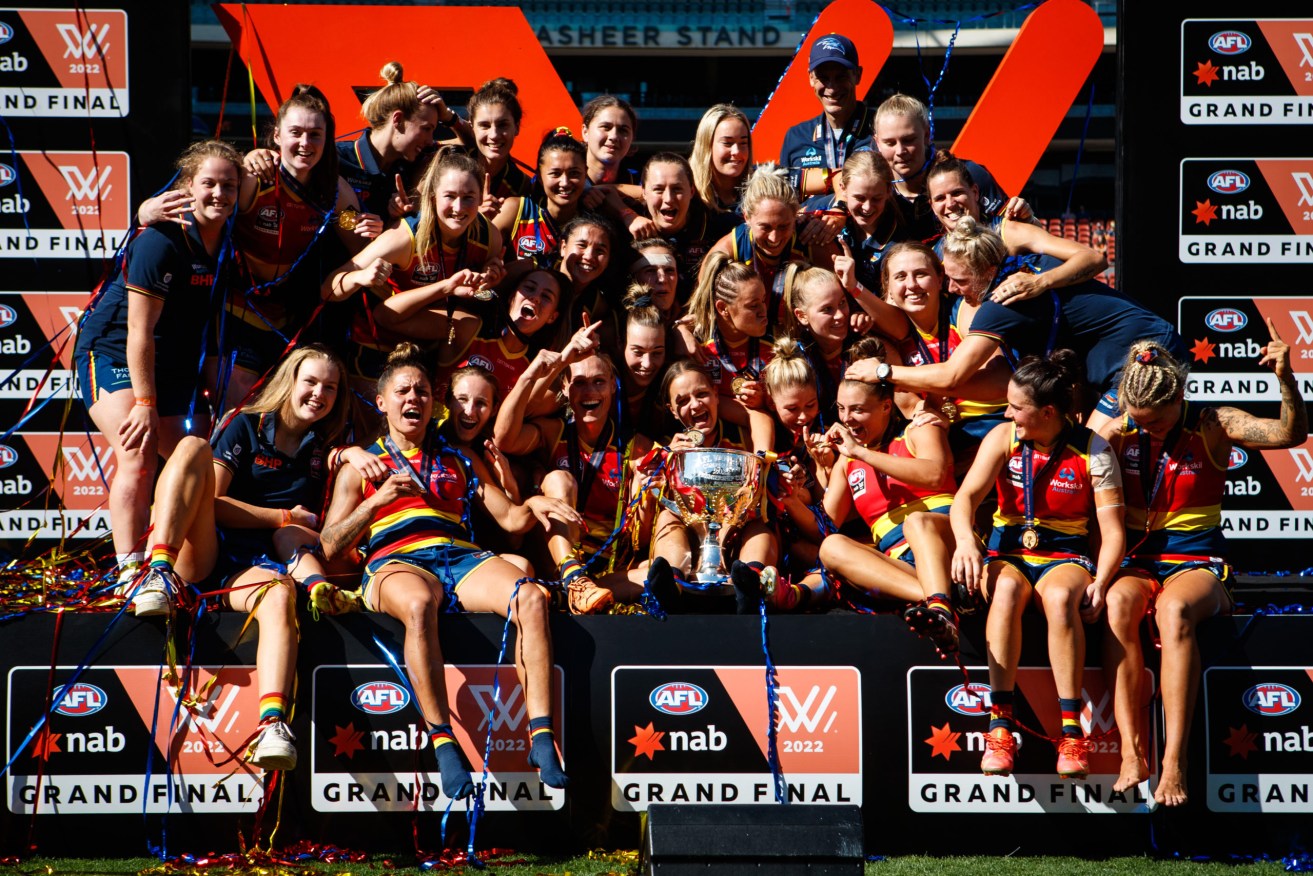
The Crows celebrate their AFLW Grand Final win against Melbourne at Adelaide Oval in April. Photo: AAP/Matt Turner
Chelsea Randall is the busiest woman in Australian football.
Actually, at this time of equality in the sport, she is the busiest person in the AFL – either men or women.
Randall’s overloaded diary has her on Friday evening at Glenelg Oval leading the Crows in their defence of the AFLW title (their third since the national women’s league was formed in 2017) and their campaign to become the first team to win two flags in one calendar year.
At the same time, Randall is:
- Training four times a week as an AFLW player – and from this week adding game day to her schedule
- Full-time development coach in the Adelaide men’s program. She is just the second woman ever involved in the Crows’ AFL program, following the ground-breaking Pat Mickan who was a part-time coach at West Lakes in 1993
- Board member to the Crows Children’s Foundation
- On-ground announcer, sharing the microphone with retired ruckman Sam Jacobs at Adelaide’s home AFL matches
- Studying for a teaching degree
“I started back in Western Australia,” the Perth-born Randall says of her studies. “Just been chipping away at it … one more year to go. It has been 12 years in the making. I will get there eventually.”
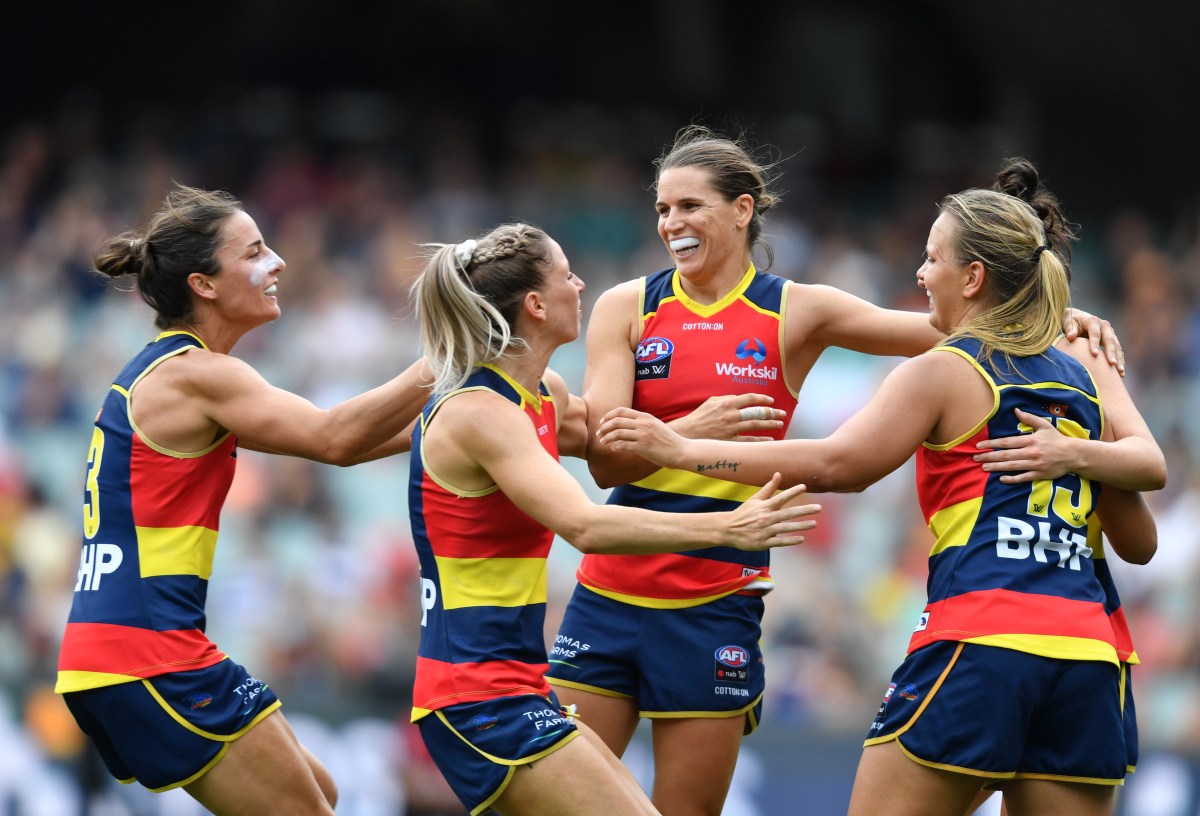
Chelsea Randall and Crows players celebrate a preliminary final win over Geelong. Photo: AAP/David Mariuz
No-one doubts it. Randall, 31, repeatedly achieves her goals, in a determined and polished way that has made the tough defender admired by more than a new generation of young women giving Australian football its biggest growth market. There are teenage boys who also marvel at Randall’s style, on and off the field.
“It’s not just the girls playing,” says Randall of the AFLW’s influence. “But there is me, signing autographs and having photos with teenage boys. And they say this is ‘awesome’. It doesn’t matter whether it is male or female football – it is just footy and we (as female players) are just being respected as athletes.”
Randall on Friday night – in a match moved from its original venue of Norwood Oval that has become waterlogged from heavy rain – will for the first time take to the AFLW field without the other pioneer who has shared the limelight as a ground-breaker in women’s football.
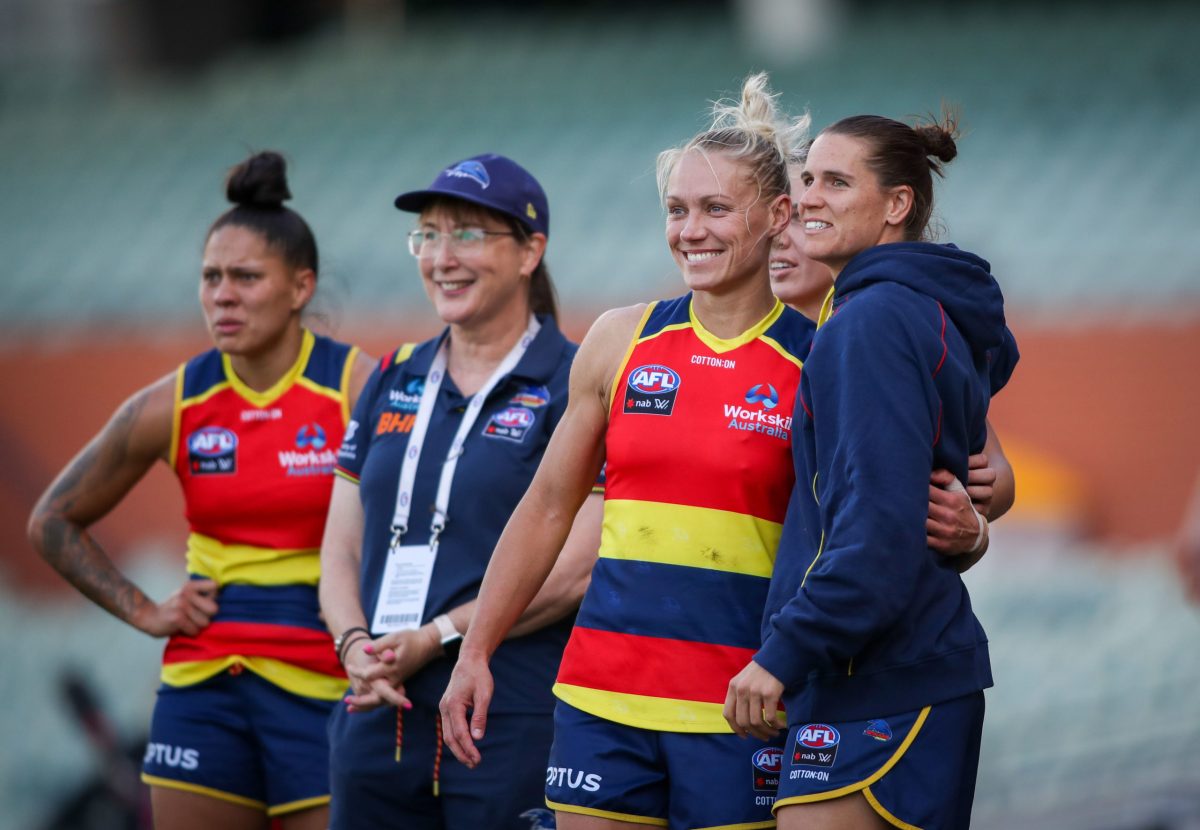
Erin Phillips with injured captain Chelsea Randall just before the April 2021 preliminary final win against Melbourne. Photo: AAP /Matt Turner
Erin Phillips is now a rival, the captain at rival Port Adelaide, which will open its AFLW story on Saturday in Perth against West Coast.
It is now Randall’s Adelaide team. But she will always carry sage (albeit borrowed) advice from Phillips.
“I always remember Erin saying to me once, ‘Sometimes Chels you have to fix your oxygen mask first before helping others’,” Randall recalled.
“Erin got it from someone else, passed it on and I share it with others too. I find it so valuable and so true.
“You need to look after yourself – you can’t keep giving to others. That is one big thing that I have learned especially as a leader. You try to do it all and be there for everyone. I don’t want to say ‘no’, but you have to find the time. Now I say, ‘Sorry, that is going to be in three weeks’ time; it’s hectic right now.”
For Randall and her successful Crows team-mates it is the busiest time in their lives. They, along with the Melbourne players they beat in the AFLW grand final at Adelaide Oval on April 9, have had the shortest pre-season in the league’s history with the shift of the season from August to late November rather than January to late March.
Adelaide, winners of the first AFLW title in 2017, will seek to become the first team to win two titles in one calendar year – and the first champions of the fully expanded AFLW that now has all 18 clubs participating.
There has been no long gap between campaigns as there was last year when Randall, who is renowned for her “love of nature”, used the off-season to return home – the slow way.
“I went camping; bought a caravan, did it up and went across the Nullabor,” Randall said. “After an AFLW season, I am pretty tired of giving myself to others so I escape for a week or so.
“I love nature. It is a big thing for me. I can tell when I have not had it – or I have been away from family. Being a West Australian, I don’t often get to see them very much.”
Time is short – and the demands on Randall’s time increase season by season.
“It’s those things thrown in at the last minute, those you have to make time for, that’s what can sometimes throw you off,” says Randall of how her weekly diary starts with plenty and becomes overloaded. “I don’t mind. It is about setting boundaries for your time. It is something I have had to learn.
“You think it would not play much of a role, but social media these days … I am on Instagram and keep my family up to date on Facebook. That is about it. All my young team-mates are saying, ‘Get Tik Tok’ and ‘Get this’. Oh god, I can’t keep up with all. It is too much.”
And now there is more AFLW.
Soon-to-depart AFL chief executive Gillon McLachlan advanced the start of the national women’s competition from 2020 to 2017. In just five years, the league is complete – and, most significant, the women’s game is underpinned by extraordinary participation numbers under the “elite” competition.
“You are talking about 17,000 girls across the nation (five years ago) to now 600,000, in the shortest space of time,” says Randall.
Was she surprised? Was it the powerful marketing themes of the AFL “brand” that powered this juggernaut in Australian sport?
“I knew what (women’s football) was capable of doing if we built it,” Randall said. “And if we put the right people in the right place to support the program or grassroots footy.
“I was lucky that I worked as a development officer for three years at (WAFL) Swan Districts Football Club before AFLW started (in 2017). I could see how many girls really wanted to play, but (there were barriers). You would get comments, from the young girls, even in primary schools, saying, ‘We really want to play at recess, but the boys won’t let us. They won’t kick us the ball’.
“There were barriers before the girls could see that they enjoyed footy. It has just taken time for those barriers to be removed.
“That is the biggest growth for me, seeing not just the girls playing, but me: I am signing autographs and having photos with teenage boys.”
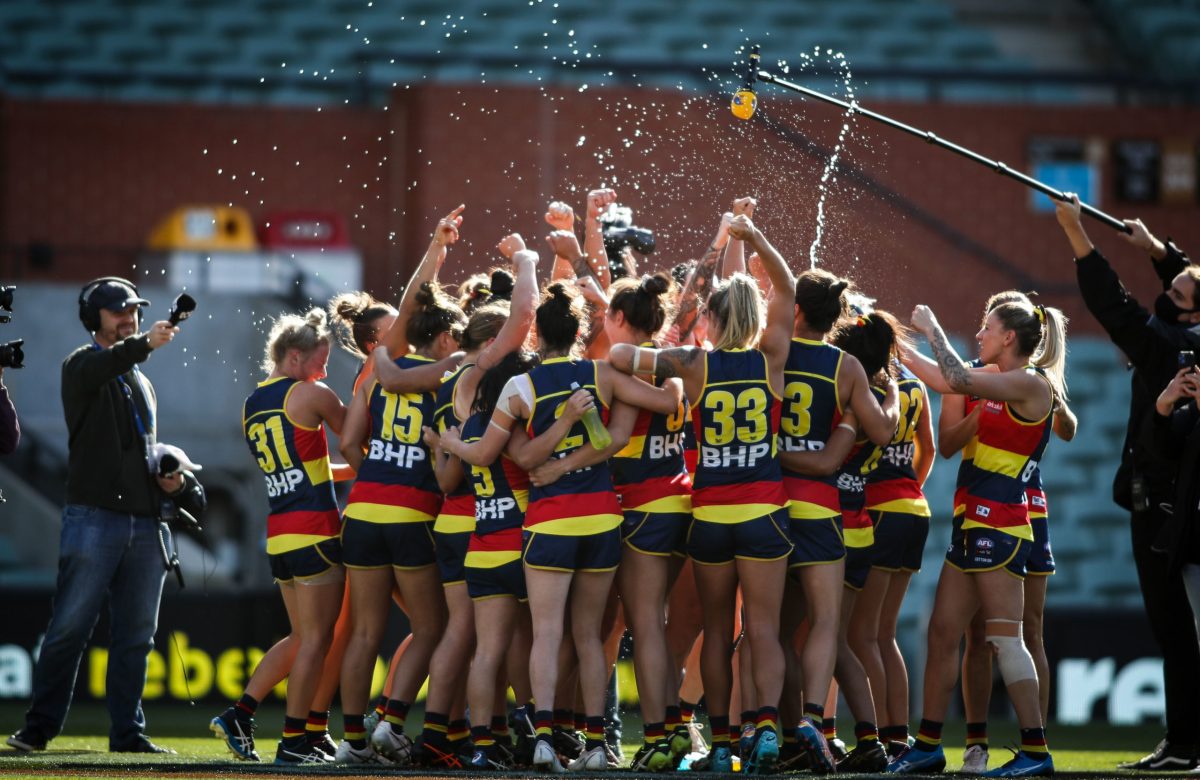
Celebrating a preliminary final win against Melbourne in April 2021. Photo: AAP/Matt Turner
AFLW is now complete with 18 teams. There are still questions on how the competition can replicate the AFL with a longer home-and-away season in which every club plays its 17 rivals at least once. The players are seeking professionalism by 2026. And the skeptics ask, can the AFLW pay its own way?
“It is really difficult to say how much money AFLW has created through the growth of participation, that is significant,” responds Randall. “How do you put a monetary figure on that (growth to 600,000 participants)? We might not have pulled in physical money in front of our eyes, but we have been able to create something that is so much bigger than just football.
“It is a sign of society changing. There is a change in how we look at what a boy or girl can do. How do you put a price on that? Hopefully, people can see the indirect value of the AFLW competition that creates diversity in our culture.
“(Professionalism) would be fantastic. There are obviously things they (the AFL and players’ union) have to work through – resources, funding, sponsors, facilities. How will AFL clubs run two or three programs (AFL, SANFL and AFLW)? That is why the conversation on the Adelaide Football Club getting a new facility (probably at Thebarton Oval) is really exciting. That is the evolution of our footy club.
“We do need a home. We do. There is no denying that. We have loved West Lakes. It has been a home. But we know this was built for an AFL team. Now we need a home for all our teams.”
Professionalism in sport does come at a price, particularly with changing values among the athletes – more so if they are spoiled by the riches of big-time contracts.
“I never want female footballers to lose their gratitude or forget where women’s football has come from,” Randall said. “I still remember when we had our water carrier coming to training sessions as a volunteer. I could not stop thanking him. It meant I did not have to run an extra 200 metres to my drink bottle every time we finished a drill. It is the simplest things that makes you really value our support staff in this game. Craig would say, ‘Chelsea, you have to stop thanking me every time I give you a cup of water’. I won’t ever do that. This is what I appreciate. We have never had this support before. We would have just one coach in amateur footy.”
AFLW “Season 7” begins with much change around Randall – new players, new rivals, new calendar, new challenges.
“Each season,” says Randall, “I find I have a different purpose each time.
“It was after the 2019 grand final (when Adelaide won its second time by beating Carlton) that I struggled to find my purpose.
“I just wanted people to value female athletes. I wanted them to feel respected and worthy. I would do everything I could on the footy field to create exciting moments so that people would watch female footy and say, ‘Wow, these athletes are amazing’.
“When you spend 16 years of your life, every weekend being told you are not good enough or you should not be playing footy, every single week as a teenager you start believing that … you start questioning your own self worth. That is the danger of other people’s beliefs. They are not true. We have to be really careful that we don’t start believing that as well.
“Going on that journey, and then we have 50,000 people at the first AFLW grand final in 2017 at Adelaide Oval. I remember being on the bench when that figure popped up on the scoreboard. I was in absolute awe. It still gives me goosebumps, that moment. I and all the other female athletes – especially female footballers – felt appreciated and respected and worthy enough by those 53,034 people showing up for us.
“Our fans play a significant role in that (self-belief) space.”
Across five years the league has grown, as has the respect between the AFL and AFLW sections of clubs. Randall is one of nine, along with Phillips at Port Adelaide, in the AFL-managed programs that embed women in AFL club coaching programs for the next two years.
“I started in July, technically to observe,” Randall said. “(But) I have been contributing in conversations and taking a drill or two which has been good. I am learning lots along the way. I knew I would get a lot out of it.
“I have worked in a development role, supporting the midfield and backline craft with our SANFL players. We have incredible coaches who engage or ask questions of me. The conversations with (Crows senior coach) Matthew Nicks are fantastic, he makes sure everyone has their voice heard. That is what makes him an incredible person leading us as a coach – he makes sure everyone is valued.
“My experience in elite sport tells me you must be authentic. You must speak up for what you see and go from there. That is what we are trying to get. This women’s coaching acceleration program with me and eight other women across the nation, we are trying to normalise the fact that females can be in the AFL as coaches and we are encouraging women after playing AFLW to have a passion for coaching. It is all transferable. We want to see more men and women working together. Diversity adds different perspectives. It is the key to a healthy culture for sustained success.
“It is not about more women in the AFL or less men in the AFLW (which has more male coaches than females). The key is to have both – it is important to have men in the AFLW; it is important to have women in AFLW as coaches and coaching and conditioning and administration. We all have our strengths. Getting the best person for the job is the key. We have to understand we need to create opportunities for diversity. We have to be seen at the table.”
AFLW Season 7 begins with Randall’s first premiership coach, Bec Goddard, as a rival at Hawthorn. Her first premiership co-captain Erin Phillips as a rival at Port Adelaide. And the fixture has the first AFLW Showdown – at Adelaide Oval on Friday, September 30.
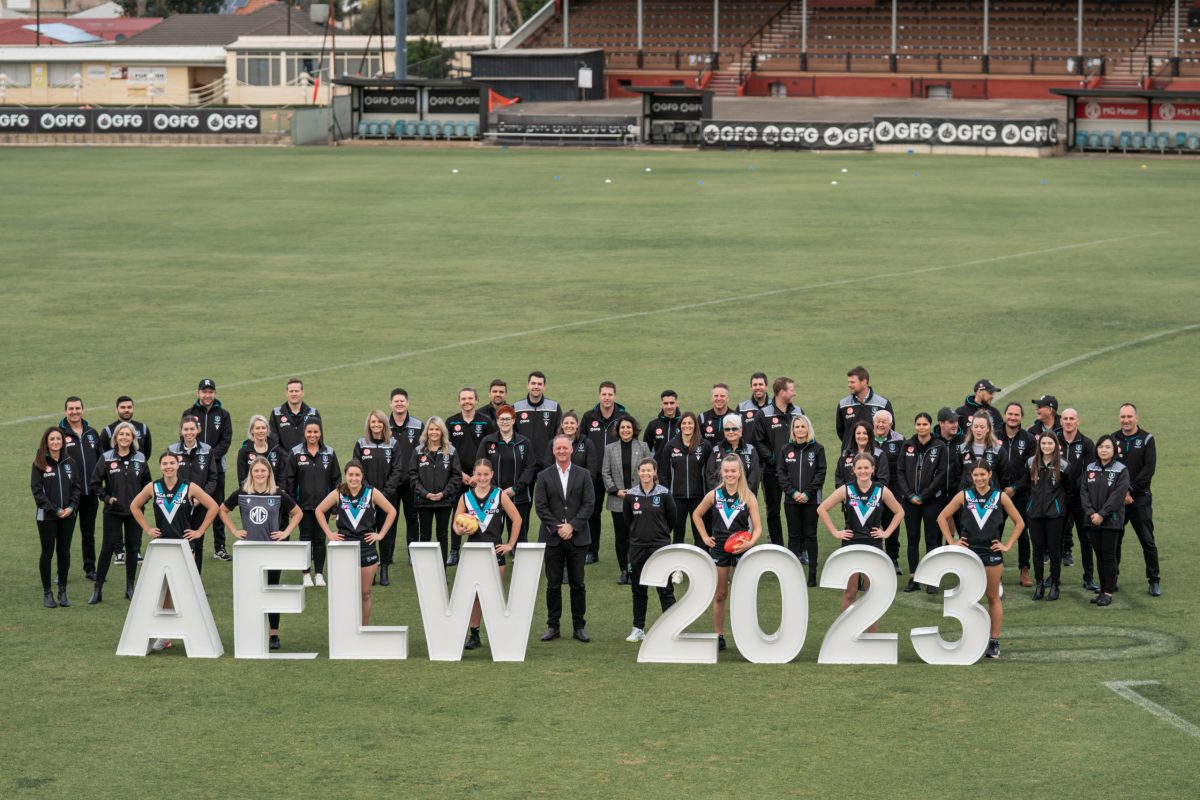
Port Adelaide marks the announcement of its AFLW team to contest the 2023 season. Photo supplied
“First time all 18 teams; first Showdown. It is going to be incredible,” says Randall. “There is a significant rivalry (already between the Crows and Port Adelaide at the women’s level). We have been the only team in town for six seasons. Now there is a team as our next door neighbours.
“South Australians are going to love having bigger supporter bases at the two clubs because we both have AFLW teams. We will see the same rivalry that we see in the men’s. I am looking forward to seeing what crowd numbers we get at our first AFLW Showdown.
“They are just incredible athletes on both sides, in both leagues, who just want to win. But there are also level heads who understand that footy is a lot of joy and passion for us and for our fans. There also is life outside of footy, particularly in AFLW where players still have other jobs and other bits and pieces. We have a good perspective on being highly competitive and a different perspective.
“I am excited for Bec (Goddard). She should be coaching again. She is one of the best coaches going around. So, she should be out there showing the world what she can do. We have seen it first hand. She is exceptional.
“Erin, I am so excited for her and the path she has chosen. It is exciting. As a friend, I am really happy for both Bec and Erin. I am looking forward to that first Showdown, that is for sure. That is going to be real fun. In our conversations, I don’t think Erin really knew where she would be playing. No doubt it was a difficult decision – stay at Adelaide or go home to Port Adelaide? I was always supportive of whatever she chose. I am happy she is where she wants to be.”
Randall is in a good place too. A very busy place.
She leads the best AFLW program – a stunning achievement considering the AFL did not want to have a team based in South Australia when launching the AFLW in 2017, arguing there was not enough talent in South Australia. This year, the SA under-18 team was the undefeated national champion.
Much of this success is the result of Randall’s Crows, who were not supposed to win a game in 2017 when they defied all – and continue with this theme under coach Matthew Clarke.
“There are a few different factors (to the success),” Randall says. “But the one underlying factor we believe in is trust and vulnerability. It builds connection.
“When we can trust in one another, on and off the field, we are holding each other accountable to the values and attitudes we expect of an elite athlete. That builds our connection. We are prepared to be vulnerable. We are authentic with one another. And when you have that trust and connection, you want to do anything and everything you can for that person, be it a staff member, coach, player, team-mate. It transfers onto the field when you have that connection.
“We have had some exceptional leaders with Bec Goddard and Matty Clarke. He is fantastic in giving clarity to everyone in what your role looks like. We have exceptional young leaders. Our players are good people. That is the culture we have set. In years to come, when we all retire, that legacy will hopefully continue.”




